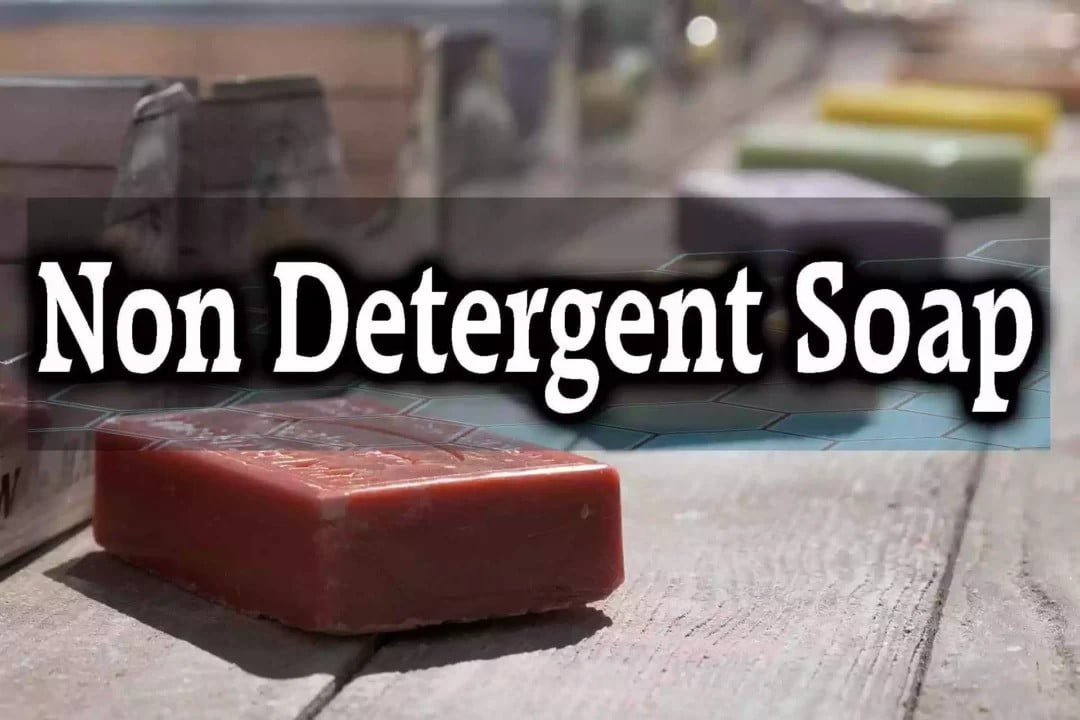Soap is a staple in daily hygiene and cleaning practices, but not all are created equal. The traditional soaps we’re accustomed to can be divided into two primary categories: detergent and non-detergent. While both serve the fundamental purpose of cleaning, they differ significantly in their composition and impact on the skin and environment. This article delves into non-detergent soaps, highlighting their unique qualities and benefits over their detergent counterparts.
Definition and Characteristics of Non-Detergent Soap

Non-detergent soap is a cleansing agent that does not contain synthetic ingredients or surfactants, commonly found in most household cleaning agents. Instead, it is crafted from natural materials such as animal fats or plant oils, which are saponified, typically resulting in a solid bar form. These soaps are known for their mildness and are particularly favored for their gentle nature on the skin.
One of the primary characteristics of non-detergent soap is its ability to clean without stripping away the skin’s natural oils. This is crucial because these natural oils form a barrier that protects the skin from irritation and dryness. Non-detergent soaps are often free from fragrances, parabens, and other chemicals that can cause allergic reactions or harm sensitive skin. Their natural composition benefits the skin and reduces the environmental impact, as they are more biodegradable than their detergent counterparts.
Comparison Between Detergent and Non-Detergent Soap

The main difference between detergent and non-detergent soaps is their ingredients and interaction with the skin and environment. Detergent soaps are typically made from synthetic chemicals and are designed to be more powerful cleaners. They contain surfactants like sodium lauryl sulfate (SLS), providing a deep, clean, and rich lather. However, these surfactants can be too harsh for the skin, often stripping away natural oils and leading to dryness and irritation.
In contrast, non-detergent soaps are made with natural ingredients that gently cleanse the skin without removing its protective oils. They tend to produce a less foamy lather but are much kinder to the skin, making them ideal for individuals with sensitive skin or conditions like eczema. Moreover, while detergent soaps can leave a residue that may irritate the skin further, non-detergent soaps are more likely to rinse cleanly away.
Environmental considerations also distinguish the two. Non-detergent soaps are typically more eco-friendly due to their biodegradable ingredients. Detergent soaps, conversely, can contain phosphates and other chemicals that may contribute to water pollution and ecosystem imbalance.
Benefits of Using Non-Detergent Soap

Skin Health: The most significant benefit of non-detergent soap is its kindness to the skin. Preserving the natural oils maintains the skin’s moisture barrier, reducing the risk of dryness, irritation, and allergic reactions. This makes non-detergent soaps especially beneficial for sensitive skin, eczema, or other conditions that make the skin more vulnerable to harsh chemicals.
Environmental Impact: Non-detergent soaps are often biodegradable, breaking down more quickly and completely than their detergent counterparts. They lack the harmful chemicals that can lead to water and soil pollution, making them a more environmentally friendly choice. Using natural ingredients typically means less energy consumption and waste in production, further enhancing their eco-friendliness.
Common Uses of Non-Detergent Soap
Personal Care: The gentle nature of non-detergent soaps makes them ideal for daily personal hygiene. They are particularly well-suited for washing the face and body, where maintaining skin moisture and balance is crucial. People with sensitive skin or conditions like acne, eczema, or rosacea often find non-detergent soaps soothing and less likely to trigger flare-ups.
Laundry and Cleaning: While less common, some non-detergent soaps are formulated for laundry or other cleaning tasks, especially where a gentle touch is needed. They can be particularly useful for washing delicate fabrics or items that harsh chemicals might damage.
Choosing the Right Non-Detergent Soap

Ingredients: Look for soaps with natural oils, such as olive, coconut, or almond oil. Avoid those with artificial fragrances, colors, or preservatives, which can negate the gentle benefits of non-detergent soaps.
Certifications: Certifications like organic or all-natural can provide reassurance about the quality and sourcing of ingredients. However, doing a little research to understand what each certification means and whether it aligns with your priorities is always good.
Skin Type and Needs: Consider your skin type and specific conditions or allergies. Non-detergent soaps come in various formulations, some with added ingredients like aloe vera or chamomile to soothe and moisturize. Choose one that best fits your skin’s needs.
Conclusion
Non-detergent soaps offer a gentle, environmentally friendly alternative to traditional detergent-based soaps. With benefits for skin health and the planet, they are an excellent choice for anyone looking to reduce their chemical exposure and support a more sustainable lifestyle. Whether for personal care or specific cleaning needs, there’s likely a non-detergent soap that fits the bill, providing all the cleanliness without the harsh side effects.

